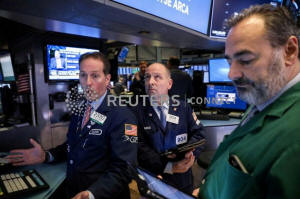Take Five: May Day, May Day! World markets themes for
the week ahead
 Send a link to a friend
Send a link to a friend
 [January 12, 2019]
(Reuters) - Following are five big themes
likely to dominate thinking of investors and traders in the coming week
and the Reuters stories related to them. [January 12, 2019]
(Reuters) - Following are five big themes
likely to dominate thinking of investors and traders in the coming week
and the Reuters stories related to them.
1/BREXIT MAY DAY
With less than 80 days to go until Britain leaves the European Union,
the path to Brexit winds to a critical crossroads on Tuesday when
lawmakers vote on Prime Minister Theresa May's withdrawal deal. The
agreement, which May and EU leaders say cannot be renegotiated and is
the only one available, will almost certainly be rejected. If so,
uncertainty, paralysis and the likelihood of a disorderly 'no deal'
Brexit will rise.
Volatility is nothing new to sterling, Friday being a microcosm of how
the FX market is playing Brexit. A media report that Britain's departure
could be delayed sent the pound shooting up nearly a cent to its highest
since Nov. 29, then minutes later May's spokeswoman ruled out any delay
and the pound fell right back again. One-month implied options
volatility in sterling is much higher than euro vol, and that's unlikely
to change any time soon. All eyes on the big vote in Parliament on
Tuesday and for sterling, moves below $1.25 or above $1.30 are both on
the table.

2/PRICE PRESSURE
The Fed reckons the world's biggest economy is continuing to motor ahead
but markets seem to think otherwise, their fears for the growth outlook
knocking equity prices off record highs. More recently though they have
cheered Fed Chairman Jerome Powell's comment that the U.S. central bank
can be patient in approving any further rate increases. Powell said that
"especially with inflation low and under control", the Fed can "be
patient and watch patiently" to figure out which of the two competing
narratives unfolds in 2019.
So whose view is correct? It's true labour markets are robust and wage
inflation has been on the rise -- average earnings rose in December by
3.2 percent on an annual basis, matching October's rise which was a
9-1/2-year high. But workers' wage gains are also being eroded by
inflation, with core CPI seen above the Fed's 2 percent target in coming
months. Powell's newly dovish-sounding rhetoric has prompted money
markets to price out Fed rate rises in 2019 but the producer price index
due Jan 15 could be key. If it shows inflationary pressures cooling,
there could be a further reprieve from markets' rate-hike concerns.
3/EARN, BABY, EARN
Global stock markets have suffered in recent weeks on fears that
economic growth -- and company earnings -- are on the decline. Upcoming
U.S. company earnings will test this view.
Big U.S. hitters due to issue fourth-quarter results next week include
Micron Technology, Netflix, and major Wall Street banks Citi, JPMorgan
and Wells Fargo. Money has started trickling back into equity funds this
week thanks to Powell's dovish comments. But earnings expectations
remain low nevertheless: I/B/E/S Refinitive data indicates S&P 500
earnings will have grown 14.5 percent in the fourth quarter of 2018, the
slowest since Q3 2017, sharply lower than the 28.4 percent rise in Q3
2018 and almost flat year-on-year.
[to top of second column] |

Traders work on the floor of the New York Stock Exchange (NYSE) in
New York, U.S., January 8, 2019. REUTERS/Brendan McDermid/File Photo

And confidence in Europe is even lower -- earnings-per-share (EPS) for STOXX 600
companies is expected to have grown 7.1 percent in Q4, half levels seen in Q3
and Q4 2017. Forecasts as recently as November were for 14 percent growth but a
spate of nasty macro-economic surprises has caused analysts to downgrade their
view.
Some strategists do reckon markets have got ahead of themselves by pricing in a
growth slowdown or recession. Company results could show who's getting it right.
4/SHIPPING NEWS
China and the United States have held their first face-to-face talks since the
two world powers agreed a 90-day trade war truce. Described as "extensive", the
talks have helped cheer up global equity investors. But risk aversion could rear
its head again should hard data from China show what damage has been done to the
economy by the initial tariff rounds.
In particular focus will be Chinese export growth. Analysts expect that to have
cooled for a second month in December as front-loading of U.S.-bound cargoes
faded. Poor data will be another incentive for Beijing to be more accommodative
with fiscal and monetary policies. It has already engaged a reserve ratio cut
for banks which should pump the equivalent of $115 billion into the economy.
What remains to be seen is how accommodative it might be with U.S. demands on
trade.
5\ TURKEY'S RE-BALANCING ACT
Having just suffered its worst year in the best part of two decades, the Turkish
lira's had a tumultuous start to 2019. It's weakened more than 2 percent
year-to-date and worse still, it experienced a flash crash on Jan. 3, which was
a reminder of all its vulnerabilities: from geopolitics to upcoming elections
and haphazard monetary policy.
On the positive side, the lira's near-30 percent tumble in 2018 had got
rebalancing off to a fast start; Turkey is now posting large current account
surpluses and inflation, albeit high, is on the decline. But many worry that
these very factors could tempt the central bank back onto the interest
rate-cutting path. On Wednesday, at its first meeting of 2019, the central bank
is expected to stand pat, with 17 out of 19 economists seeing key rates steady
at 24 percent. But two predicted a cut and the bank's own survey finds that
Turkish interest rates are seen falling almost 500 basis points in the coming
year.

The picture is less dramatic in South Africa which is seen leaving interest
rates unchanged at 6.75 percent on Thursday, with rising inflation likely
prompting a rate hike in May.
(Reporting by Jennifer Ablan in New York, Marius Zaharia in Hong Kong; Jamie
McGeever, Josephine Mason and Karin Strohecker in London; compiled by Sujata Rao)
[© 2019 Thomson Reuters. All rights
reserved.] Copyright 2019 Reuters. All rights reserved. This material may not be published,
broadcast, rewritten or redistributed.
Thompson Reuters is solely responsible for this content. |